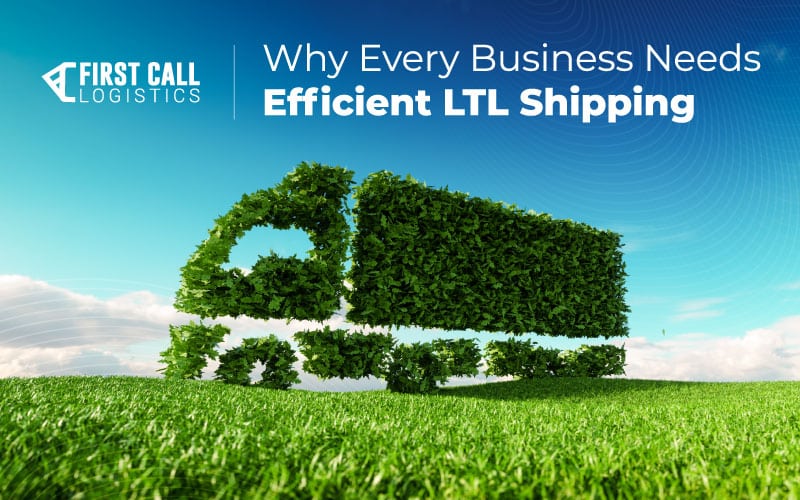Why Every Business Needs Efficient LTL Shipping

Less-than-truckload shipping (LTL) is the primary method for moving cargo too large to ship in packages, but too small to fill an entire trailer by itself. With LTL freight, a carrier contracts with multiple companies to move partial loads in a single shipment. Each partial load (usually loaded on pallets) is retrieved by a carrier, who then follows an optimized route covering multiple stops to ensure each partial shipment is delivered to its own unique destination as efficiently as possible.
There are many benefits to using LTL freight, especially for small businesses and companies dealing heavily in ecommerce. Here are a few reasons you might consider shipping your next load via LTL.
LTL Shipping Is Cost-Effective
Even large companies can have trouble filling a trailer to capacity, and waiting for enough orders to necessitate a full trailer can lead to slow shipping times and disgruntled customers. When using full-truck-load shipping (FTL), a company has two options:
- Wait until there is enough cargo to warrant a full load to ship
- Ship immediately with the trailer partially empty
Option one is cost-effective, but it requires more time — time companies don’t have as more ecommerce brands are forced to offer same-day or next-day shipping incentives. Option two will get your products to customers quickly, but at a significantly higher shipping rate (plus, moving all that empty space takes excess fuel and resources, which in turn hurts your sustainability efforts).
For freight with flexible delivery dates, LTL is the cost-effective solution. Rather than waiting to collect enough orders to fill a truck or suffering a loss just to accelerate shipping speeds, prepped cargo can be sent to an LTL carrier for pairing with other partial loads, lowering costs without sacrificing shipping delays.
LTL Shipping Is Sustainable
Thanks to LTL’s more thoughtful resource management (ie. not shipping half-empty trailers across the country), LTL shipping also tends to be more eco-friendly.
In recent years, establishing more sustainable practices in shipping has become a selling point for the vast majority of ecommerce customers. A recent survey found 81% of consumers believed companies use excessive packaging while shipping their products, and more than half of all survey respondents claimed they were willing to pay extra to have their orders fulfilled using more eco-friendly shipping and packaging options.
In response, many companies are altering supply chain processes to be more eco-friendly and reduce waste. Combining partial shipments into one LTL lowers the number of trucks on the road and thus reduces the amount of fuel used and pollution released by carrier vehicles, lowering the shipper’s carbon footprint.
Downsides to LTL Shipping
Disadvantages to LTL shipments generally stem from the increased risk of lost or damaged goods present whenever additional links are added to your supply chain. LTL shipments require more handling, more stops, more stays in different facilities and more interaction with other shippers’ freight in transit. While damages are still rare, the potential for mishandled products is higher than with full truckload shipments.
Other major downsides include more variable delivery times and more convoluted quoting processes. Most businesses want supply chains to run on precise delivery windows, but the flexibility LTL affords also requires some wiggle room to operate. Some product deliveries can stand to arrive within a larger time frame, but generally drivers, shippers and customers all prefer to know exactly where and when their products will arrive.
As for quoting difficulties, LTL shipments naturally require lots of clear communication to ensure your products fit in a trailer alongside other unrelated freight. That means exact weight, dimensions, pickup locations, packaging types, temperature requirements and other delivery details need to be conveyed and accommodated for safe delivery.
LTL Is Ideal for Ecommerce and Small Businesses
The benefit of LTL shipping is it doesn’t matter how much freight you have — it’s a highly flexible business model that can help ecommerce and small businesses thrive.
Since few small businesses are regularly moving full truckloads of freight, FTL shipping isn’t generally a viable option. With LTL shipping, smaller brands can access all the benefits of a professional shipping service while still maximizing cost-savings as a growing business. Additionally, the flexible nature of LTL shipping means these companies can quickly adapt to increasing amounts of freight per load if demand suddenly spikes.
Did you know that First Call offers LTL shipping services? We’d love to help you optimize and protect your supply chain by adding LTL shipping modes.
Simplify your Next Shipment with First Call Logistics
Building and managing cost-efficient supply chains is a full-time job. First Call’s rare combination of in-house assets, expert problem-solving and track record of stellar customer service makes us the 3PL of choice for business partners with a wide range of shipping needs.
More Resources for FCL Shippers:
Get the latest supply chain news and updates directly to your inbox.